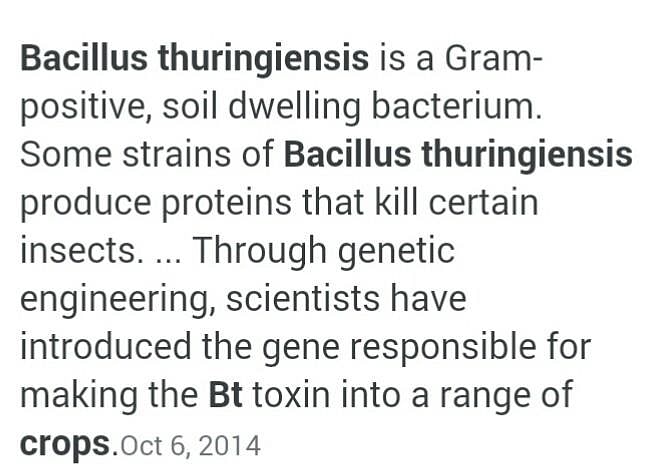NEET Exam > NEET Questions > Why's Bacillus thuringiensis considered suita...
Start Learning for Free
Why's Bacillus thuringiensis considered suitable for developing GM plants?
Verified Answer
Why's Bacillus thuringiensis considered suitable for developing GM pla...
Bacillus thuringiensis is a Gram-positive, soil dwelling bacterium. Some strains of Bacillus thuringiensis produce proteins that kill certain insects. Bacillus thuringiensis forms protein crystals during a particular phase of their growth. These crystals contain a toxic insecticidal protein. The Bt toxin protein exists as inactive protoxins but once an insect ingest the inactive toxin, it is converted into an active form of toxin due to the alkaline pH of the gut which solubilizes the crystals. The activated toxin binds to the surface of midgut epithelial cells and creates pores that cause swelling and lysis and eventually cause death of the insect. The toxin is coded by a gene named cry. There are a number of them, for example, the proteins encoded by the genes cry I Ac and cry IIAb control the cotton bollworms, while the cry IAb controls corn borer. Thus, it is helpful in controlling the variety of insect pests. Through genetic engineering, scientists have introduced the gene responsible for making the Bt toxin into a range of crops. Hence, Bacillus thuringiensis is considered suitable for developing G.M. plants.
 This question is part of UPSC exam. View all NEET courses
This question is part of UPSC exam. View all NEET courses
Most Upvoted Answer
Why's Bacillus thuringiensis considered suitable for developing GM pla...

Community Answer
Why's Bacillus thuringiensis considered suitable for developing GM pla...
Because bacillus thuringiensis has the ability to divide at faster rate so by removing infection causing capacity it can be used to transfer and multiply many copies of desirable gene to form GM plants.
Attention NEET Students!
To make sure you are not studying endlessly, EduRev has designed NEET study material, with Structured Courses, Videos, & Test Series. Plus get personalized analysis, doubt solving and improvement plans to achieve a great score in NEET.

|
Explore Courses for NEET exam
|

|
Similar NEET Doubts
Why's Bacillus thuringiensis considered suitable for developing GM plants?
Question Description
Why's Bacillus thuringiensis considered suitable for developing GM plants? for NEET 2024 is part of NEET preparation. The Question and answers have been prepared according to the NEET exam syllabus. Information about Why's Bacillus thuringiensis considered suitable for developing GM plants? covers all topics & solutions for NEET 2024 Exam. Find important definitions, questions, meanings, examples, exercises and tests below for Why's Bacillus thuringiensis considered suitable for developing GM plants?.
Why's Bacillus thuringiensis considered suitable for developing GM plants? for NEET 2024 is part of NEET preparation. The Question and answers have been prepared according to the NEET exam syllabus. Information about Why's Bacillus thuringiensis considered suitable for developing GM plants? covers all topics & solutions for NEET 2024 Exam. Find important definitions, questions, meanings, examples, exercises and tests below for Why's Bacillus thuringiensis considered suitable for developing GM plants?.
Solutions for Why's Bacillus thuringiensis considered suitable for developing GM plants? in English & in Hindi are available as part of our courses for NEET.
Download more important topics, notes, lectures and mock test series for NEET Exam by signing up for free.
Here you can find the meaning of Why's Bacillus thuringiensis considered suitable for developing GM plants? defined & explained in the simplest way possible. Besides giving the explanation of
Why's Bacillus thuringiensis considered suitable for developing GM plants?, a detailed solution for Why's Bacillus thuringiensis considered suitable for developing GM plants? has been provided alongside types of Why's Bacillus thuringiensis considered suitable for developing GM plants? theory, EduRev gives you an
ample number of questions to practice Why's Bacillus thuringiensis considered suitable for developing GM plants? tests, examples and also practice NEET tests.

|
Explore Courses for NEET exam
|

|
Suggested Free Tests
Signup for Free!
Signup to see your scores go up within 7 days! Learn & Practice with 1000+ FREE Notes, Videos & Tests.

























